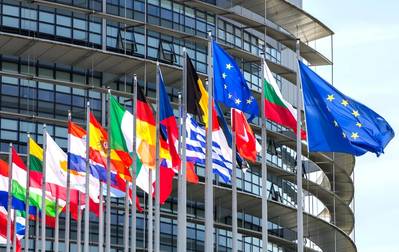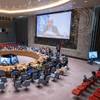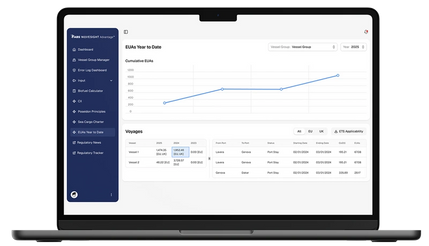EU Unveils Sustainable Transport Investment Plan
The European Commission has adopted its communication on the Sustainable Transport Investment Plan (STIP), setting out a roadmap to rapidly accelerate the energy transition of aviation and waterborne transport sectors.
To meet the fuel targets set out in the ReFuelEU Aviation and FuelEU Maritime Regulations, a significant volume of around 20 million tonnes of sustainable alternative fuels (13.2 Mt of biofuels and 6.8 Mt of e-fuels) will be needed by 2035. This calls for substantial investments from the market, with an estimated €100 billion required by 2035 to drive production.
Regulatory stability is key for attracting investments into renewable and low-carbon fuels. With the STIP, the Commission sends a clear signal to investors that its targets are stable, and that it will support the sector throughout the transition.
The Commission says: By accelerating the production of EU-made sustainable fuels, Europe can significantly boost its competitiveness, reduce its energy dependency on fossil fuels and lead this industrial transition, on the way to reaching climate neutrality by 2050. Europe is already a global leader and holds most of the know-how and industrial leadership in this sector.
The EU measures under this plan are expected to mobilise at least €2.9 billion until the end of 2027.
The Commission will propose €300 million by end of this year to support the production of hydrogen for sustainable aviation (SAF) and maritime (SMF) fuels through the European Hydrogen Bank.
The Commission will support R&I projects with around €133 million under Horizon Europe.
The Commission will mobilise €153 million for synthetic aviation fuel projects and €293 million for maritime fuel projects under the Innovation Fund.
In the medium-term, the EU needs an intermediary mechanism connecting fuel producers and buyers to provide revenue certainty and de-risk investments. The Commission will work towards establishing such a mechanism.
Commissioner for Sustainable Transport and Tourism, Apostolos Tzitzikostas, stated: "Our Sustainable Transport Investment Plan is a decisive step towards a sustainable future. It’s not just about cutting emissions – it’s about building a stronger, more competitive and resilient Europe that leads in sustainable transport. This ambitious plan shows the Commission’s firm commitment to scaling up renewable and low-carbon fuels in aviation and waterborne transport. Success will depend on close cooperation among Member States, industry, financiers and civil society to turn this challenge into a strategic opportunity for Europe."
ECSA responds
European Shipowners welcomed the STIP as a good first step.
“We’ve got ambitious climate targets but not the clean fuels we need for the energy transition. STIP is putting investments in clean fuels at the centre of the competitiveness agenda. These investments are necessary for retaining industrial capacity, for enhancing competitiveness, for reducing energy dependencies and for getting to net zero,” said Sotiris Raptis, Secretary General of European Shipowners | ECSA.
European Shipowners welcome STIP’s suggestion to use national ETS revenues to support the uptake of clean fuels for shipping. The EUR 9 billion generated from the contribution of shipping to the EU ETS should be used to bridge the immense price gap with clean fuels that are on average four times more expensive than conventional fuels.
“STIP takes a major first step towards the use of the national ETS revenues to make clean fuels for shipping available at a competitive price. National ETS revenues have contributed substantially to the scale-up of renewables in Europe. We need to see the same happening for shipping. The use of the ETS revenues should also be matched by a binding mandate on European suppliers to make clean fuels available for shipping” Raptis added.
European Shipowners firmly support reducing administrative burden, especially for SMEs which are the backbone of European shipping. Therefore, European Shipowners welcome the commitment of the Commission to assess the burdensome reporting requirements for shipping companies and simplify rules. However, the EU should go a step further and send a clear message on the full alignment of EU climate legislation with the IMO international measures, when adopted.
“Ensuring an international level playing field is essential for the competitiveness of European shipping. We expect a clear message from the Commission that the EU will fully align its policy framework with international measures when adopted at IMO level” said Raptis.
Danish shipowners respond
For Danish Shipping, the current lack of fuels must be addressed urgently.
“The EU is in imminent danger of being overtaken by China and other ambitious players when it comes to the production of the green fuels we need to power our ships. It is therefore very positive that the Commission has focused on this issue in the STIP. The Commission proposes several sensible action points and investments, and we look forward to seeing these move from strategy to reality,” said Anna Vejlby Ib, Head of Danish Shipping’s EU Representation.
Danish Shipping has previously proposed that part of the DKK 3.8 billion that Danish shipping alone is expected to contribute annually once the sector is fully included in the EU Emissions Trading System (EU ETS) in 2026 should be earmarked to bridge the price gap between fossil and green fuels — both in production and consumption.
The organization says it is therefore encouraging that the European Commission is now urging Member States to allocate sufficient ETS revenues to the maritime and aviation sectors, including for the production of sustainable and low-emission fuels. The EU itself should follow suit and earmark ETS revenues for the green transition of shipping.
“The EU must focus on ensuring supply, price stability, and competitiveness when it comes to green fuels. The EU should, among other things, set common European targets for the production of green fuels. At Danish Shipping, we view positively the Commission’s proposal on de-risking long-term contracts and introducing two-sided auction mechanisms to reduce the price gap between fossil and green fuels. This is simply a prerequisite for implementing the EU’s own initiatives such as FuelEU Maritime and ReFuelEU Aviation, which aim to reduce greenhouse gas emissions,” said Ib.
Danish Shipping also strongly supports the Commission’s ambitions to strengthen cooperation with partner countries such as Morocco, Algeria, and Egypt — where there is abundant sun, wind, and robust energy infrastructure.
“It is positive that the Commission maintains its focus on competitiveness and the green transition at the same time — not least at a time where other forces are pulling in the opposite direction. Shipping is — and must remain — part of the solution. But that requires the EU to dare to invest massively in the green transition now. The world is not standing still — and neither must Europe,” said Ib.
World Shipping Council (WSC) responds
WSC says financial measures are key in EU's STIP implementation to make renewable fuels competitive.
“The European Commission’s publication today of the Sustainable Transport Investment Plan (STIP) is a promising first step toward accelerating the energy transition in Europe for shipping,” says Jim Corbett, WSC’s Environmental Director, Europe.
“The plan sets out a framework for financing to unlock investments and scale up production of renewable and low-carbon fuels. Now the strategy must be taken forward in ways that deliver real impact on maritime decarbonization.”
World Shipping Council is eager to work with the Commission to ensure the STIP translates to concrete measures that bridge the cost gap between renewable marine fuels and conventional bunkers. Without this, production and uptake will stall despite significant fleet investments already made by the liner shipping sector.
WSC calls for the funding outlined in the STIP to focus on:
• Price-bridging measures that make renewable fuels competitive, enabling their use by dual-fuel ships.
• Targeted incentives for renewable fuels to bring production to scale.
• De-risking market investment mechanisms connecting producers and buyers to de-risk investments and accelerate market development.
These measures are essential to help unlock the estimated €100 billion investment needed by 2035 and to ensure that funds mobilized through InvestEU, the European Hydrogen Bank, and the Innovation Fund deliver maximum impact.
Demand for renewable maritime fuels is growing. WSC’s Dual-Fuel Fleet Dashboard shows the readiness of liner fleets, with over €150 billion invested in dual-fuel ships, ready to run on zero/near-zero fuels by 2030. These investments will only translate into GHG emissions reductions if renewable fuels become available at competitive prices.
While the STIP focuses on investment, Europe must not lose focus on additional measures critical for the transition:
• Fit-for-purpose certification of global fuel production to ensure environmental integrity and support early uptake.
• Strategic port infrastructure investments for green fuel bunkering and onshore power supply, to be outlined in the upcoming EU Port Strategy.
SASHA responds
Aurelia Leeuw, Director of EU Policy at the Skies and Seas Hydrogen-fuels Accelerator (SASHA) Coalition, said: “The Commission deserves credit for taking concrete steps to finance and de-risk e-fuel production – especially through the creation of a double-sided auctioning system that can finally bridge the price and contract gaps between fossil and e-fuels, which marks a real stride forward.
"But the STIP still falls short where ambition matters most. An extension of the ETS is still missing, and without it, we won’t generate the revenues needed to truly accelerate decarbonisation in aviation and maritime. And while it’s positive to see recognition of zero-emission aircraft and hydrogen’s role, support for zero-emission technologies across the board remains limited.
"Finally, on book-and-claim, the Commission risks diluting its own goals by not keeping the system focused on e-kerosene produced within the EEA. This is a missed chance to strengthen Europe’s competitive edge in e-fuel innovation. In light of global inaction at the International Maritime Organization (IMO) and International Civil Aviation Organization (ICAO), the EU now has a unique opportunity to lead by example and turn regional ambition into global momentum.”













